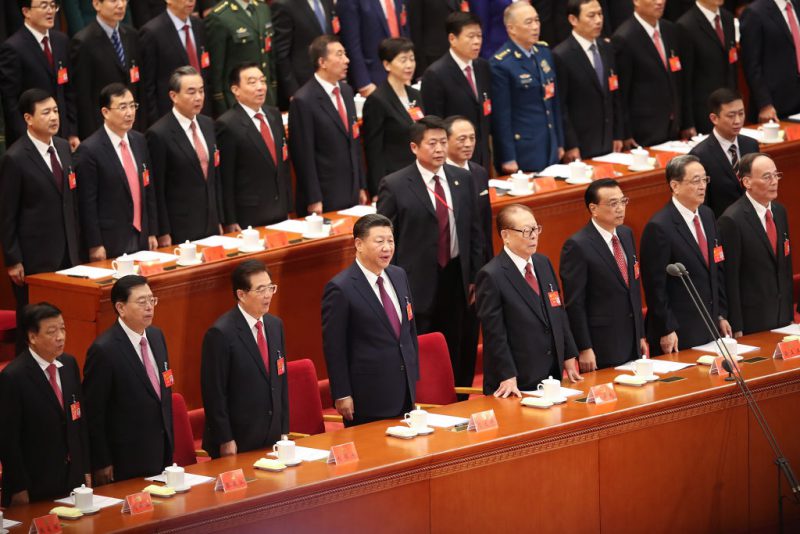If the mandate of heaven is withdrawn

The strategic risks for Australia are large in a post-CCP China. China’s domestic regime operates in ways that are repugnant to Western conceptions of democratic and human rights, and the Chinese Communist Party employs power without constraint to repress dissent and to secure control. It would gratify Western moral sensibilities over justice and liberal values if China moved to transform itself into a modern market-based democratic polity. But it would be a policy disaster.
The demonstrators in Hong Kong are held up as champions of universal values and depicted as occupying some moral high ground. For some commentators they represent the ‘resilience of the human spirit’. The Hong Kong crisis is between ‘authoritarian China’s one-party political and legal system’ and brave protesters whose aim is ‘preserving Hong Kong’s rule of law and expanding the people’s voices in how they are governed’. They ‘shame’ all those who of talk ‘airily and in abstract terms about the importance of “stability”’.
From the perspective of the Western liberal tradition, China’s treatment of Uyghurs in Xinjiang; actions in Tibet; denial of religious freedom to Muslims, Buddhists and Christians; and widespread use of capital punishment are all more morally offensive than the interference in Hong Kong. Western leaders, public figures, religious dignitaries and the media are obliged to call out these indefensible abuses and justified in criticising the Chinese authorities. But there is no shame in governments taking seriously their responsibilities for the security and prosperity of Australian citizens.
The morality of those supporting the Hong Kong protesters is ambivalent. They are justified in being concerned that the basic political and legal rights guaranteed until 2047 under the bargain struck between Britain and China are being undermined. Before 1997, Hong Kong was administered as a British colony: ‘Hong Kong was governed by a team of British officers recruited in Britain, and trained and deployed by the British Government to its colonies.’ The rights embedded in the basic law are limited and transitory, and after 2047 the central government is free to determine Hong Kong’s status. China’s long-term sovereign position in Hong Kong is indisputable.
Moral outrage, even when warranted, tends towards exaggeration. That ‘the future of the Chinese Communist Party’s rule of the multi-ethnic empire that makes up today’s China’ is at risk is contestable. As is the assertion that ‘the kind of relationship Xi’s state can have with other nations’ is at stake. Most nations will look on the disorder in Hong Kong as an unwelcome domestic political issue, which pragmatically it is. The countries around China’s periphery and those with strong financial and economic ties to the Chinese economy will not wish to see the disruption and chaos that would accompany the fall of the CCP.
George Kennan, a doyen of American foreign policy, argued that the government’s ‘primary obligation is to the interests of the national society it represents, not to the moral impulses that individual elements of that society may experience’. A more germane and significant observation of Kennan’s is that, even when governments ‘allege that this or that practice in a foreign country is bad and deserves correction’, they seldom advance ‘conceivable alternatives’. He emphasises that at the heart of the morality-versus-pragmatism tension in international relations is ‘the effort to distinguish at all times between the true substance and the mere appearance of moral behaviour’.
What is the alternative for China, realistically? Let’s assume the Hong Kong protests ignite some previously masked, and unquenchable once aroused, mainland Chinese passion for liberalism and representative democracy. It is improbable, but let’s imagine vast crowds in the streets on the mainland calling for the removal of the central government and democratic reforms. The CCP would not easily surrender its power and peacefully and freely move to a political and economic system in which it was just one player or ran the risk of being deprived of power altogether. Such a colour revolution in China would probably prove futile.
The worst scenario of massive and persistent revolt is frightening. The security, political and economic systems are linked together with the party from the top to the bottom. If Tiananmen is taken as a guide, the response would be rapid, brutal and sustained. The coherence of the state would be under pressure. Political repression would have serious consequences for economic activity and the military would be on a tinder-dry fuse as it watched for external enemies that might wish to take advantage of the turmoil.
As China descended into chaos and perhaps broke up, the world would be desperate for the ‘stability’ at which it is so easy to scoff. Australia would find its economy in tatters and the strategic environment in the Asia–Pacific region crumbling. Japan and South Korea would be on high alert and North Korea’s propensity to be opportunistic would create anxiety and uncertainty. On China’s borders, frictions with neighbours would be sure to increase.
There’s no apparent path for China to move to another political–economic system without great loss of life, social collapse, national fragmentation, and probably war. Giving hope or support to Hong Kong’s protesters is not a moral act or good policy. In international law, China’s sovereignty is unquestioned and the rights the protesters are fighting for are time limited.
It is deeply in Australia’s interests that China remains stable and prosperous and confident of its security. That inevitably means that for the foreseeable future the CCP must remain the ruling power.
It would be nice if the West could act on its moral values and coerce or engineer a different, democratic outcome. But foreign and strategic policy, while not bereft of values and morality, should be firmly grounded in pragmatism in the face of reality. There’s no shame in that.